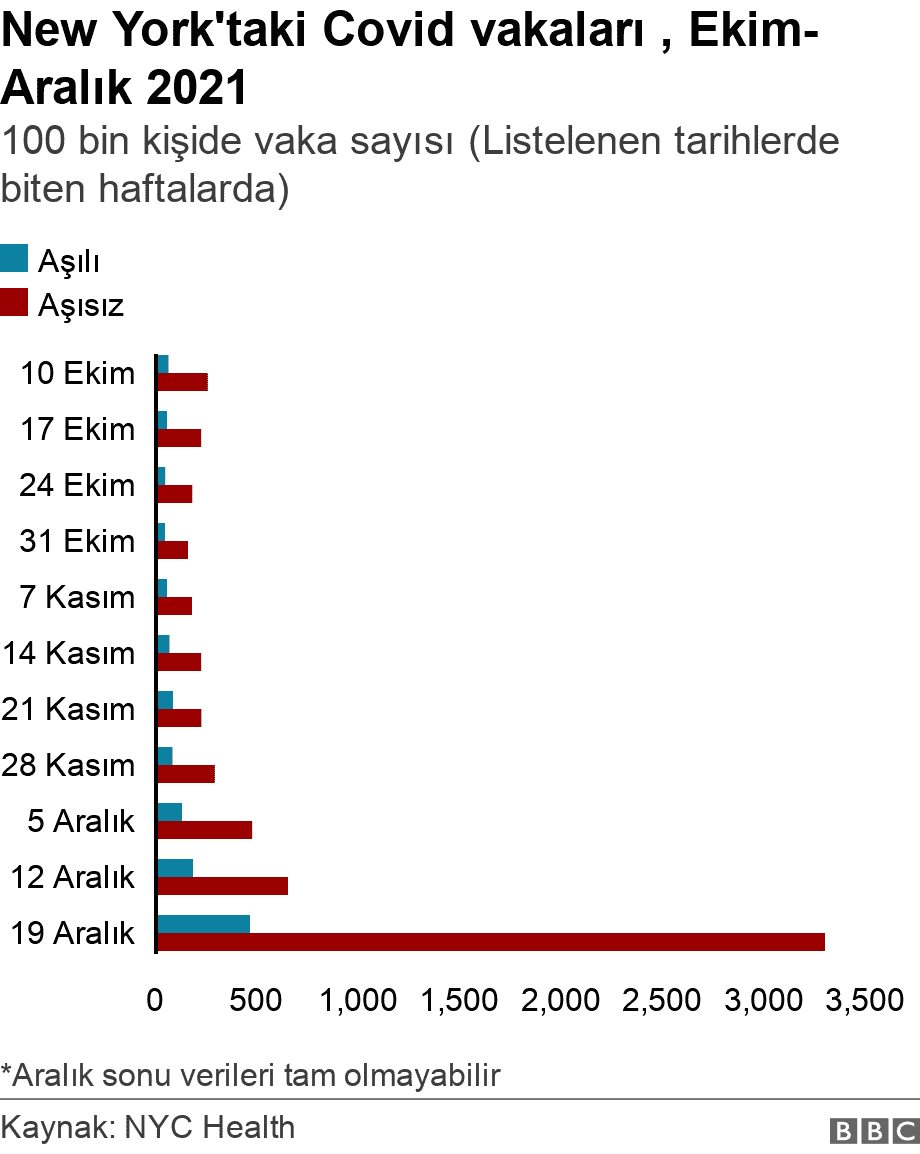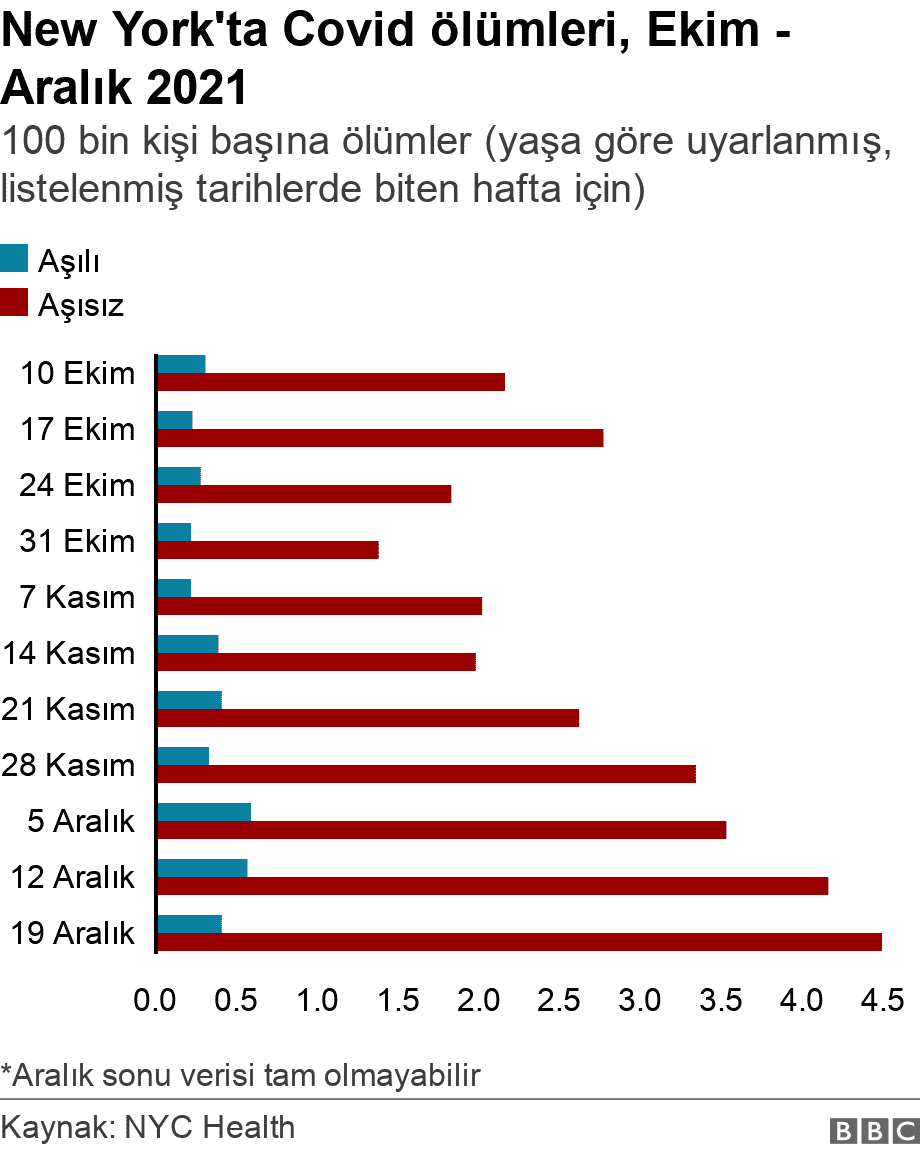There is an increase in Covid-19 cases worldwide.
Due to the combination of Delta and Omicron variants, record cases are seen in the USA, France, England, Argentina, Brazil and many other countries.
Scientists, doctors and healthcare organizations continue to rely on a variety of vaccines that have been tested and proven to protect against infection around the world.
We looked at how effective vaccines were in controlling the pandemic:
Considering the record number of new cases in countries such as the USA, France and England, the effectiveness of vaccines has again become a topic of discussion on social media.
Some users criticized the measures taken by some authorities to promote vaccines, while others complained about the potential side effects of vaccines.
The main side effects seen so far are mild and go away on their own within a few days. The main complaints include redness and pain at the injection site, fever, headache, fatigue, muscle aches, chills and nausea.
More serious side effects, such as anaphylactic shock, blood clots, inflammation of the pericardium and heart muscle, are described by health officials as ‘rare’. They feel that the benefits of vaccination outweigh the risks.
We talked to Renato Kfouri, specialist in pediatrics and infectious diseases, about the effectiveness of current vaccines and how vaccinated people can catch and transmit the disease.
Kfouri says Pfizer, AstraZeneca, Jannsen and other first-wave vaccines aim to reduce the risk of severe illness that causes hospitalizations and deaths.
“Vaccines protect better against moderate, mild, or asymptomatic Covid than its more severe forms. The more severe the disease, the greater the effectiveness,” says Kfouri, who is also director of the Brazilian Vaccine Foundation.
So the primary goal of vaccine developers was never to stop the infection itself. They aimed to make the invasion of the coronavirus more harmless to the body.
The same logic applies to the flu vaccine, which has been around for decades.
The main purpose of the annual flu vaccine is not to prevent infection. However, the vaccine prevents complaints that are common in vulnerable groups such as children, pregnant women and the elderly.
If we look at it from a broader perspective, the prevention of severe illness directly affects the entire health system. Preventing severe respiratory infections also means less crowded emergency rooms, more beds in intensive care units, and more time for the healthcare system to properly treat patients.
The data also show that vaccines play this role very well. As of November 2021, coronavirus vaccines prevented 1.1 million deaths and 10.3 million hospitalizations in the US alone, according to the Commonwealth Fund.
The European Center for Disease Control and Prevention (ECDC) and the World Health Organization (WHO) estimate that 470,000 lives have been saved in 33 countries over the age of 60 since the introduction of vaccination.
What is the explanation for the current situation?
It is an undeniable fact that the cases and re-infections among the vaccinated have increased recently, and this can be explained by three factors.
The first is simple: People usually get together over New Year’s and Christmas. This increases the risk of coronavirus transmission.
Second, almost a year after the first doses in some parts of the world, experts have found that immunity to Covid-19 does not last forever after vaccination.
“Over time, we’ve seen the level of protection decrease. This will be more or less depending on the type of vaccine and the age of the individual,” explains Kfouri:
“This underlined the need for a third dose. First for the elderly and the immunocompromised, then for the entire adult population…”
The third factor has been the arrival of the Omicron variant, which is more contagious and more effective against immunity from vaccines or previous exposure to Covid-19.
“In this situation, it has to be perceived as a really common occurrence for vaccinated people to become infected, and we have to learn to live with it,” says Kfouri.
“Luckily, the recent increase in Covid cases has resulted in fewer hospitalizations and deaths. Especially among the vaccinated. The vaccine continues to protect against the most severe forms of the disease, as expected.”
Tables from the New York health system also clearly show the effectiveness of vaccines in practice. It highlights the increase in infection, hospitalization and death rates between the vaccinated and the unvaccinated.
In December, cases, hospitalizations, and deaths in the city rose sharply among the unvaccinated (purple line), while the vaccinated (orange line) remained broadly the same. This can be seen in the following three graphs:
 The first table shows how fast the increase in the number of cases towards the end of December in New York and the large difference in the rates of vaccinated and unvaccinated reported cases.
The first table shows how fast the increase in the number of cases towards the end of December in New York and the large difference in the rates of vaccinated and unvaccinated reported cases.
In the second graph, we can see a similar increase in hospitalizations among the unvaccinated. However, this is not seen in the vaccinated. Although hospitalizations increased in the vaccinated, it was very limited compared to the increase in the unvaccinated.
 In the third chart, we can see that deaths among the unvaccinated increased steadily in New York in December. In the vaccinated population, the peak is reached in the week ending December 5, and then begins to decline.
In the third chart, we can see that deaths among the unvaccinated increased steadily in New York in December. In the vaccinated population, the peak is reached in the week ending December 5, and then begins to decline.
Overall, those who have the coronavirus vaccine have fewer cases, fewer hospitalizations and fewer deaths.
 The UK Health and Safety Agency reached a similar conclusion in a recent report.
The UK Health and Safety Agency reached a similar conclusion in a recent report.
A study in the report was conducted at the University of Cambridge and concluded that if a person is infected with the Omicron variant, the risk of hospitalization is 81% less if they have had all three doses of the vaccine.
A second study by the agency found that three doses of the vaccine are 88% effective against infection, but it’s unclear how long this protection will last and whether more doses will be needed in the coming months.
For Kfouri, this is all evidence of the importance of the vaccine in the context of the Omicron variant and the increasing number of cases:
“It’s absolutely wrong not to get vaccinated just because everyone will get sick anyway. The vaccine often succeeds in turning the virus into a simpler disease that can be treated at home.
“Only if the population is highly vaccinated, including children, we will be able to get out of the pandemic. And by following basic hygiene rules, using masks, avoiding crowds and washing our hands…”
